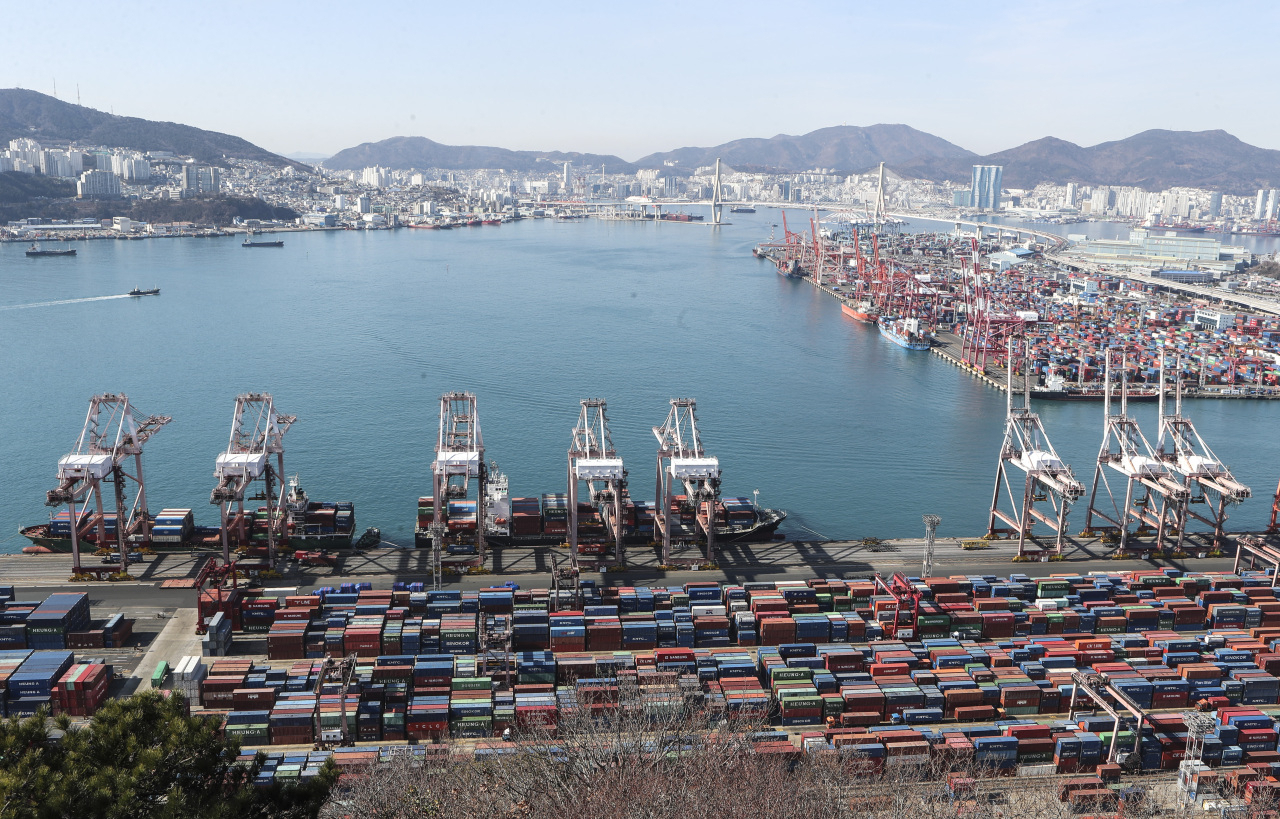External risks, weak domestic demand stand in way of S. Korea's exports-led recovery in 2024
By YonhapPublished : Dec. 26, 2023 - 09:29

The South Korean economy is expected to be on track for a recovery in 2024 on rising exports, but sluggish growth looms large as higher-for-longer interest rates and sticky inflation could further hamper global growth and domestic demand, experts said Tuesday.
South Korea has faced multiple economic challenges in 2023 posed by the global economic downturn caused by aggressive monetary tightening by major economies to curb inflation and geopolitical risks stemming from the Middle East conflict and the Russia-Ukraine war.
But the economy has shown signs of improvement in recent months, supported mainly by a turnaround in the semiconductor industry, and the momentum is widely expected to continue through the year to come.
"Next year's growth rate is projected to hover over the country's potential growth rate of 2 percent. Exports of goods are likely to rise further, and service exports are also expected to increase on rising demand for tourism," said Jung Kyu-chul, a researcher of the state-run Korea Development Institute.
"The recovery, however, has resulted partly from a low base effect, and the pace of the growth will be very gradual," he added.
The Bank of Korea forecast 2.1 percent economic growth next year, accelerating from this year's 1.4 percent.
The Organization for Economic Cooperation and Development presented a 2.3 percent growth outlook, and the International Monetary Fund said the South Korean economy is expected to expand 2.3 percent in 2024.
Exports, a key economic growth engine for South Korea, had fallen for 12 months in a row through September but rebounded in October and rose further the following month on the back of a recovery of global semiconductor demand.
In November, chip sales logged the first on-year increase since August 2022 on growing demand and rising prices. Semiconductors are one of the country's major export items, which accounted for 17 percent, or the largest share, of the total exports in November.
The government has not yet put forth its own forecast of how much the overall economy and exports will grow next year, but officials have forecast a 5 percent on-year export expansion at the least.
But such prospects are subject to a high degree of uncertainty, as they largely depend on the cycle of the semiconductor industry and a turnaround of the global economy, particularly in China.
SK Group Chairman Chey Tae-won told reporters earlier this month that the semiconductor market "hit rock bottom," but it is too early to say when demand will rise in earnest.
"I hope the recovery of the semiconductor cycle in the first half of next year, but it remains to be seen. Demand for DRAM chips is getting better, but that for NAND flash memory chips remains dormant," Chey said.
The chief also noted that the Chinese economy is unlikely to improve anytime soon, and that will likely affect the South Korean economy.
China is South Korea's No. 1 trading partner after the United States.
The Chinese economy is projected to grow at 5.4 percent in 2023, but the growth is expected to slow to 4.6 percent next year amid continuing weakness in the property market and subdued external demand, the IMF said in a report issued in November.
Many analysts also expected the US to experience a marked economic slowdown next year.
"The slowdown in growth of the main trading partners and higher-for-longer global interest rates act as a drag on near-term growth," the IMF said in its recent report on the South Korean economy.
The BOK jacked up its benchmark interest rate by a cumulative 300 basis points from August 2021 through January 2023 to fight high-flying inflation and has since kept it unchanged at 3.5 percent.
The level is the highest since 2008.
The central bank is unlikely to raise the rate further, but it is widely expected to maintain the current rate for a while in an effort to bring inflation down to its target rate of 2 percent.
"Inflation is still far above our target level, so it is far from easy to ease vigilance," BOK Gov. Rhee Chang-yong said during a press conference last week.
"The pace of the price decline will be slower than expected. The last mile to achieving the target rate of inflation may prove more challenging," he said, pointing to uncertainties in the prices of global oil and raw materials and higher labor costs, among other factors.
Inflation declined significantly after peaking in mid-2022, but it stayed above 3 percent for the fourth consecutive month in November due to high prices of energy and farm goods.
The government said inflationary pressure has been easing more gradually than earlier expected, though the country is projected to reach the 2 percent target by end-2024.
High interest rates and inflation have worsened conditions for corporate investment and consumer confidence, and wavering demand is expected to continue, experts said.
"Private consumption is projected to climb around 1.8 percent next year compared with this year's 1.9 percent on weak demand for goods, and facility investment will expand at a very moderate pace. It, accordingly, seems to push the unemployment rate to 3 percent next year from this year's 2.7 percent," Jung said.
Finance Minister nominee Choi Sang-mok has said that many people have "not felt the warmth of a recent economic recovery," vowing to prioritize the stabilization of people's livelihoods.
According to a survey by the Korea Chamber of Commerce and Industry (KCCI), 48.9 percent of 90 economic researchers and professors said the economy is forecast to remain weak in the first few months of 2024 before gaining traction in the second half.
"The core keyword that the exports picked to describe next year's economic situation was 'at a crossroads,'" KCCI official Kang Suk-woo said. "The year 2024 will be a crucial moment for South Korea in the face of both internal and external headwinds." (Yonhap)




















